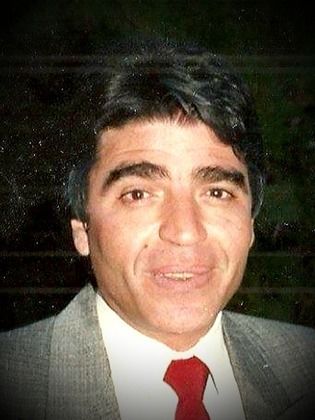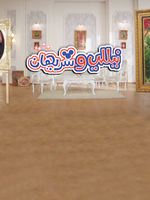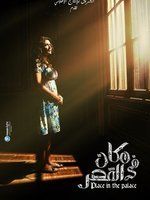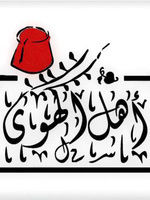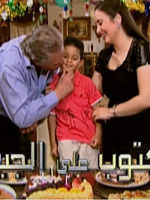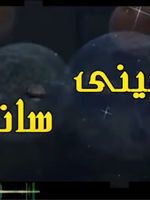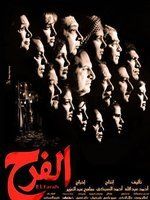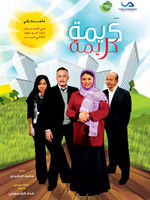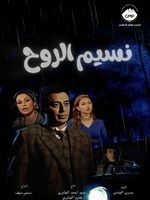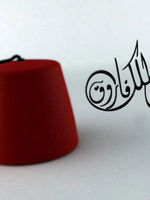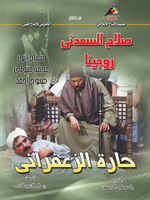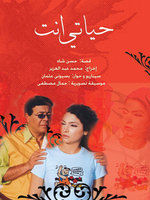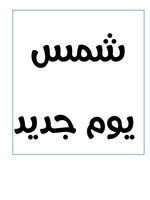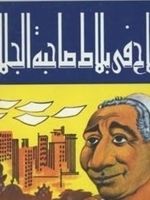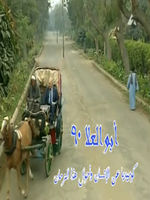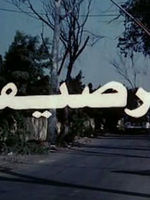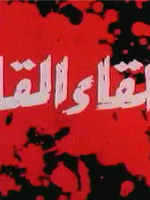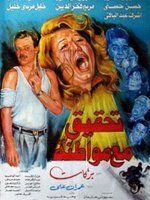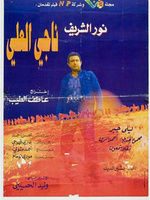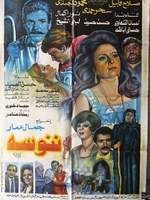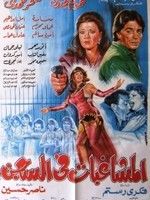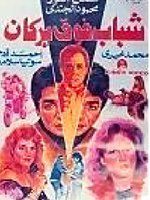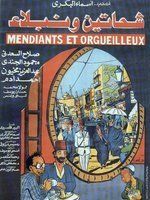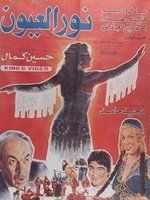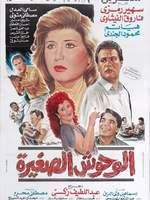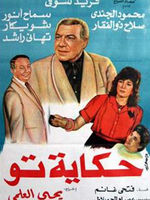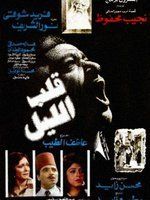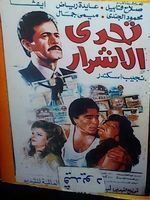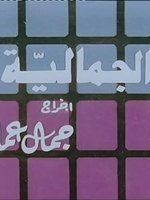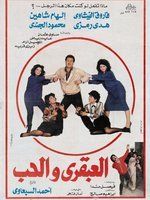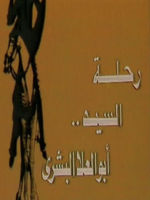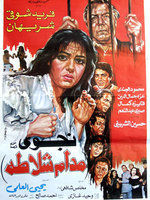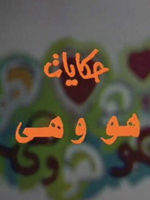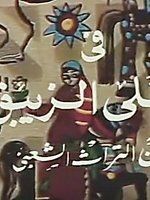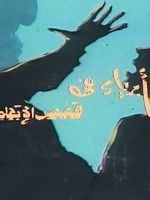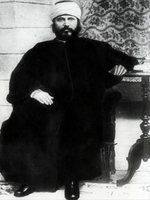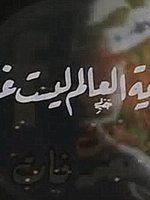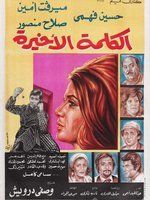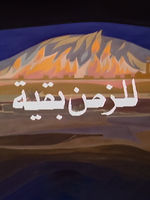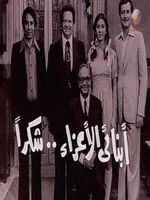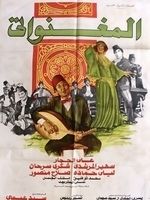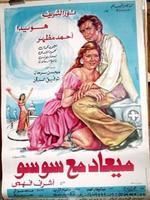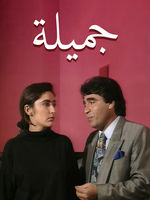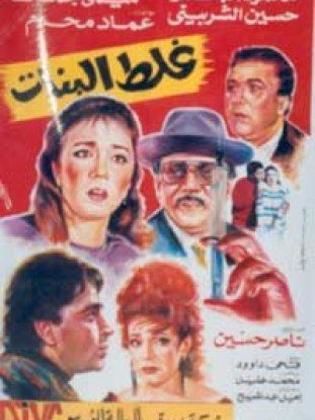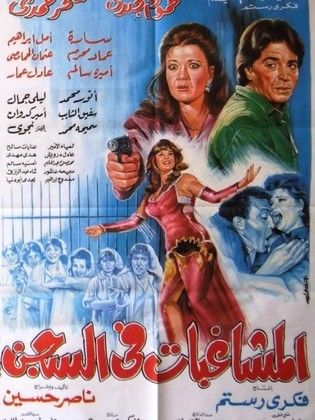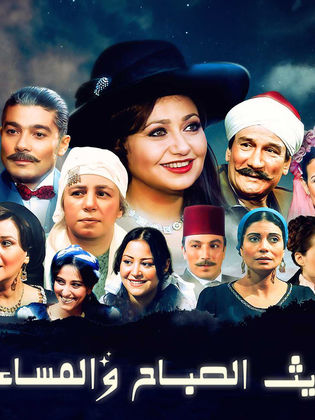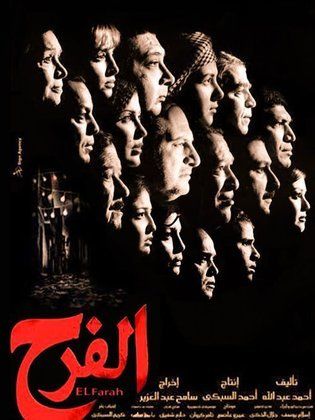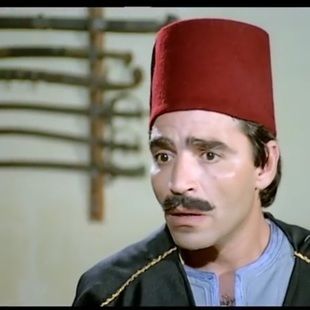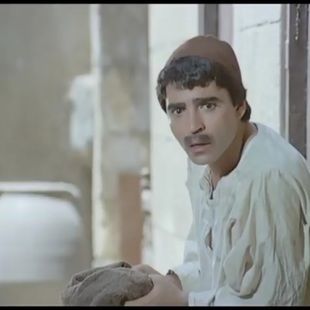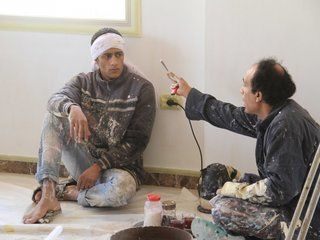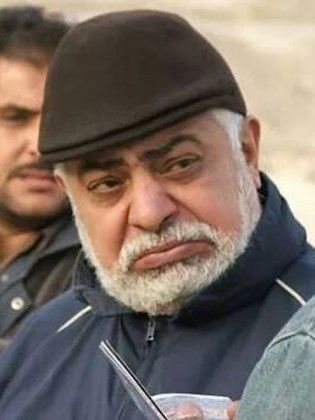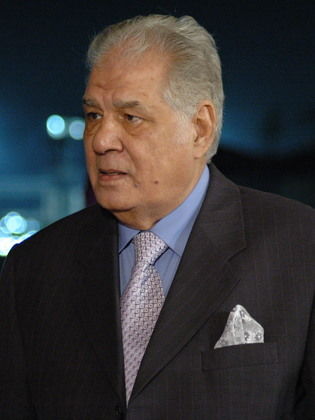Mahmoud El Gendy (1945 - 2019) محمود الجندي
Biography
He is an Egyptian actor, born in Beheira Governorate in 1945 into a family of nine children. He enrolled in the Higher Cinema Institute and graduated in 1967. Mahmoud Elgendy worked in cinema, theater and television. Among the plays he worked in: Antara, The Princess, and It Is...Read more Really a Respectable Family. He was known in the cinema and television through the supporting roles he played, including: Naji El Ali, A Bitter Day and a Sweet Day, and Shams El Zanaty.
-
- Nationality:
- Egypt
-
- Date of Birth:
- 24 February 1945
-
- Birth Country:
- Egypt
-
- Death Country:
- Egypt
Watch Online (Sponsored By Yango Play)
-
-
- Feeha Eh Yaani
- 2025 - Movie
-
-
- 2 Qahwa
- 2025 - Series
-
-
- Ward w Shokolata
- 2025 - Series
-
-
- One Last Sin
- 2025 - Series
-
-
- Al Shater
- 2025 - Movie
-
-
- Rocky El Ghalaba
- 2025 - Movie
-
Actor (391)
-
-
- Afrah Ebles 3
- 2025 - Series
-
-
- Afrah Ebles 2
- 2019 - Series
-
-
- Laugh When You Die
- 2018 - Play
-
-
- El Kowayeseen
- 2018 - Movie
- (Guest Actor)
-
-
- Bani Adam
- 2018 - Movie
-
-
- Souq Al Gomaa
- 2018 - Movie
More (385)
-
-
- El Ab El Rohi
- 2017 - Series
-
-
- Al Gama'a 2
- 2017 - Series
-
-
- Al-Toofan
- 2017 - Series
-
-
- El-Qerd Beytkalem
- 2017 - Movie
-
-
- Ramadan Kareem
- 2017 - Series
- (Karim)
-
-
- Zel El Raees
- 2017 - Series
-
-
- Horob Edterary
- 2017 - Movie
-
-
- El Haram El Rabea
- 2016 - Movie
-
-
- Balad El Sultan
- 2016 - Play
-
-
- Kalb Baladi
- 2016 - Movie
-
-
- Mamlaket Youssef El Maghraby
- 2016 - Series
- (Guest Actor)
-
-
- Min Talatin Sana
- 2016 - Movie
-
-
- Nelly and Sherihan
- 2016 - Series
-
-
- Baad El Bedaya
- 2015 - Series
-
-
- Zawaj Bil Ikrah
- 2015 - Series
-
-
- Tareeqy
- 2015 - Series
- (Salem)
-
-
- Kudurat Gheir Adiya
- 2015 - Movie
-
-
- Lahfa
- 2015 - Series
- (Guest Actor)
-
-
- Ya Ana Ya Enty
- 2015 - Series
-
-
- Ibn Halal
- 2014 - Series
-
-
- El Harb El A'lameya El Talta
- 2014 - Movie
-
-
- The Best Is Yet to Come
- 2014 - Movie
-
-
- Sharea' Abdel Aziz 2
- 2014 - Series
-
-
- Makkan fil Qasr
- 2014 - Series
-
-
- El Rakeen
- 2013 - Series
-
-
- Ahl El Hawa
- 2013 - Series
-
-
- Taht El-Ard
- 2013 - Series
-
-
- Hekayet Hayat
- 2013 - Series
-
-
- Mazag Al-Kheir
- 2013 - Series
-
-
- Okht Therese
- 2012 - Series
-
-
- Imam Al Ghazali
- 2012 - Series
-
-
- Al-Baltaji
- 2012 - Series
-
-
- Al-Khawaga Abdul-Qader
- 2012 - Series
- (Kamal)
-
-
- Bab Al Khalq
- 2012 - Series
- (Hamed)
-
-
- Rad Fe'l
- 2012 - Movie
-
-
- Rakam Maghol
- 2012 - Series
-
-
- Saa W Noss
- 2012 - Movie
-
-
- Shams Al Ansari
- 2012 - Series
-
-
- Virtiigoo
- 2012 - Series
-
-
- Adam
- 2011 - Series
- (عم امين)
-
-
- Al Shawareh Al Khalfia
- 2011 - Series
-
-
- Al-Mefataraty
- 2011 - Series
-
-
- What Will Be,Will Be
- 2011 - Series
-
-
- Mini Sat
- 2011 - Series - Riddles
-
-
- Iktefaa Saied Mahran
- 2010 - Series
-
-
- The Closed Doors
- 2010 - Series - Radio
-
-
- Al Gama'a
- 2010 - Series
-
-
- Al-Hara
- 2010 - Series
-
-
- Samir we Shahir we Bahir
- 2010 - Movie
-
-
- Ayza Atjawaz
- 2010 - Series
-
-
- Disconnected
- 2010 - Movie
-
-
- Mozakerat Saye'at Al-Som'a
- 2010 - Series
-
-
- Msh Alf Liela W Liela
- 2010 - Series
-
-
- The King of Beggars
- 2010 - Play
-
-
- Akhar Ayam Al Hob
- 2009 - Series
-
-
- Arwah Hadeaa
- 2009 - Series
-
-
- Al Adham
- 2009 - Series
-
-
- Al Haya Lonha Bambi
- 2009 - Series
-
-
- El Farah
- 2009 - Movie
-
-
- Almasrawia 2: fi alriyf walbanadir
- 2009 - Series
-
-
- Awlad alhilal
- 2009 - Series
-
-
- Sehr Ma Fat Men Konooz Al Mareyat
- 2009 - Movie
-
-
- Si Ali Wa Tabeou Qoffah
- 2009 - Play
-
-
- Asafir Al-Nil
- 2009 - Movie
-
-
- Alasan Malish Ghyrk
- 2009 - Series
-
-
- Fustan Farah
- 2009 - Series
-
-
- Karima .. Karima
- 2009 - Series
-
-
- Law Kunt Nasi
- 2009 - Series
-
-
- Nesma and Nassib
- 2009 - Series - Sitcom
-
-
- Al-Daly 2
- 2008 - Series
-
-
- Al-Aaref Bellah El Imam Abdel-Halim Mahmoud
- 2008 - Series
-
-
- El Fanar
- 2008 - Series
-
-
- 'Ayam alrueb wa elhob
- 2008 - Series
-
-
- Ala Ganb Ya Osta
- 2008 - Movie
-
-
- Ali Mubarak
- 2008 - Series
-
-
- Fi Ayd Amina
- 2008 - Series
-
-
- Kabareeh
- 2008 - Movie
-
-
- Lesank Hosank
- 2008 - Series
-
-
- Leilet El-Baby Doll
- 2008 - Movie
-
-
- Spirit Breeze
- 2008 - Series
-
-
- Al-Daly 1
- 2007 - Series
-
-
- Al-Malek Farouk
- 2007 - Series
-
-
- Barhouma Is in Shambles
- 2007 - Play
-
-
- Al-Mandash Stories
- 2007 - Series
-
-
- Kharig Ala Al Qanoun
- 2007 - Movie
-
-
- Maganeen Nos Kom
- 2007 - Movie
-
-
- Welad Al Lazina
- 2007 - Play
-
-
- 30 Mustafa Hussein St.
- 2006 - Series
-
-
- Tutu w Pyjama
- 2006 - Series
-
-
- Haret El Zaafarany
- 2006 - Series
-
-
- Hayati Enta
- 2006 - Series
-
-
- Darab Al-Tayeb
- 2006 - Series
-
-
- Kashkul likull mowatin
- 2006 - Series
-
-
- Mubaraa Zawjia
- 2006 - Series
-
-
- Mateam Chi Tutu (Al Mateam)
- 2006 - Series
-
-
- Wahed Men El Nas
- 2006 - Movie
-
-
- W Al Hob Aqwaa
- 2006 - Series
-
-
- Al Zahir Baybars
- 2005 - Series
-
-
- Ali Jinnah Tabrizi
- 2005 - Series
-
-
- Karim Abo Al Mafahem
- 2005 - Series - Riddles
-
-
- Awraq Masrya 3
- 2004 - Series
-
-
- Eish Ayamak
- 2004 - Series
-
-
- Misr Al Gadida
- 2004 - Series
-
-
- Halahota wa Barakota
- 2004 - Play
-
-
- El Mesaharaty
- 2003 - Series
-
-
- Al-Nass Fi Kafr Askar
- 2003 - Series
-
-
- Knife-edge
- 2003 - Series
-
-
- Shams Youm Gadeed
- 2003 - Series
-
-
- Fares Al Romanceya
- 2003 - Series
-
-
- Falah Fi Balat Sahebt Al Galala
- 2003 - Series
-
-
- Qamar Sebtember
- 2003 - Series
-
-
- The Howdah
- 2002 - Series
-
-
- 'Awraq masryia 2
- 2002 - Series
-
-
- Haras Silah
- 2002 - Series
- (Adel)
-
-
- Sayf Alyaqin
- 2002 - Series
-
-
- Sharbat
- 2002 - Series
-
-
- Sheea Fe Sabri
- 2002 - Play
-
-
- Taraeeoo
- 2002 - Play
-
-
- Al Sera Al Hilaliya 3
- 2001 - Series
-
-
- Al Kumy
- 2001 - Series
-
-
- Ah Ya Dounia
- 2001 - Series
-
-
- Hadith Al-Sabah wal Masaa'
- 2001 - Series
-
-
- Anbar and the Colors
- 2001 - Movie
-
-
- Maqam Al Malti
- 2001 - Series
-
-
- Ahlam Rubabikya
- 2000 - Series - Radio
-
-
- Soft Shackles
- 2000 - Series
-
-
- Who's the Assailant?
- 2000 - Series
-
-
- Al Hassan Al Basri
- 2000 - Series
-
-
- الحلم والألم
- 2000 - Series
-
-
- Al Ghaleb wal Maghlob
- 2000 - Series
-
-
- Drive Me Crazy
- 2000 - Series - Radio
-
-
- Robabekya
- 2000 - Series
-
-
- Zezenia 2: Al Layl W Al Fanar
- 2000 - Series
-
-
- Attempted Murder
- 2000 - Movie
-
-
- La taqtuluu alhob
- 2000 - Movie
- (Magdy)
-
-
- Eftah Albak
- 1999 - Series
-
-
- Al Juzoor
- 1999 - Series
-
-
- Love and Sliding
- 1999 - TV
-
-
- AlGhroob La Ya'ty Sern
- 1999 - Series
-
-
- Barber of Baghdad
- 1999 - Play
-
-
- Samhwny Makansh Qasdi
- 1999 - Series
-
-
- Shwyat Eial
- 1999 - Movie
-
-
- Amu Aziz
- 1999 - Series
-
-
- Early Retirement
- 1999 - Series
-
-
- Hamman Yabhath aan Hammam
- 1999 - Series
-
-
- Communion
- 1998 - Series
-
-
- Al Gayboba
- 1998 - Movie
-
-
- Al Fahlawi
- 1998 - Series
-
-
- Al Qarasinah wa Kanz Al Dahab
- 1998 - Movie - Cartoon
-
-
- Al Moftah Al Daayie
- 1998 - Series
-
-
- The Last Mission
- 1998 - Series
-
-
- Alwagh Alakhar lel Qamar
- 1998 - Series
-
-
- Awraq Masrya 1
- 1998 - Series
-
-
- Junun alfirakh
- 1998 - Movie
-
-
- Shaqlabaaz
- 1998 - Series
-
-
- Something Other Than Love
- 1998 - Series
-
-
- Sadaqa Allahu Al Azeem
- 1998 - Series
-
-
- Azraa Wadi Feiran
- 1998 - Series - Radio
-
-
- Luebat wa Qalabt Bigad
- 1998 - Series
-
-
- We Mnen Ageeb Nas
- 1998 - Series
-
-
- Altaw'am
- 1997 - Series
-
-
- The Harvest
- 1997 - Series
-
-
- Al Shaarie Al Gadid
- 1997 - Series
-
-
- Allasu almuhtaram
- 1997 - Movie
-
-
- Al Motaham Al Barea
- 1997 - Series
-
-
- Helm El Ganouby
- 1997 - Series
-
-
- Zezenia 1: El Wali w El Khawaga
- 1997 - Series
-
-
- Ayilat Al Fak Al Muftaris
- 1997 - Play
-
-
- Endama Tadhak Al Awtar
- 1997 - Series
-
-
- Harun al-Rashid
- 1997 - Series
-
-
- Abo El Ela 90
- 1996 - Series
-
-
- Ana Wa Zawgati Wa Al Nassab
- 1996 - Series
-
-
- Hawaa 2000
- 1996 - Movie
-
-
- Rabaa Returns
- 1996 - Series
-
-
- Zoqaq Al Songokdar
- 1996 - Series
-
-
- Qulub Haera
- 1996 - Series
-
-
- Wagh Elkamar
- 1996 - TV
-
-
- The Sixth Member Is Time
- 1996 - Series
-
-
- Abu Al Qassem Al Tanbury & His Brothers
- 1995 - Series
-
-
- Eithnayn Fi Wahid
- 1995 - Series
-
-
- Alf Layla wa Layla: Ali Baba wa El Arbaein Harami
- 1995 - Series
-
-
- Ballo
- 1995 - Play
-
-
- Nawaem's Luck
- 1995 - Play
-
-
- Sheta' Laho Nehaya
- 1995 - TV
-
-
- Ghurayb fa almina'
- 1995 - Movie
-
-
- Kelab El Madina
- 1995 - Movie
-
-
- Wa Tamdi Al Ahzan
- 1995 - TV
-
-
- The One Who Built Egypt
- 1994 - Play
-
-
- Almilyunayr alsaeuluk
- 1994 - Movie
-
-
- Helal's Mother in Cairo
- 1994 - Series
-
-
- En Fatak Al Meri
- 1994 - Series
-
-
- Vigilantes of Al-Helmiya
- 1994 - Movie
- (Moustafa)
-
-
- Belly Dancers' Lane
- 1994 - Movie
- (Abbas)
-
-
- Zaman Al Aqweaa
- 1994 - Series
-
-
- Enaq el mot w el hyat
- 1994 - TV
-
-
- Qalb Al-Asad
- 1994 - Series
-
-
- Red Card
- 1994 - Movie
-
-
- Hala w Al Darawish
- 1994 - Series
-
-
- Wagooh Lilhob
- 1994 - Series
-
-
- Nothing Is Sweeter Than Honor
- 1993 - Movie
-
-
- Alrasif
- 1993 - Movie
-
-
- El Shootar
- 1993 - Movie
-
-
- The Final Return
- 1993 - Series
-
-
- The Deadly Encounter
- 1993 - Movie
-
-
- Durgham Sons
- 1993 - Movie
-
-
- Will You Marry Me Sweetie
- 1993 - Play
-
-
- Tahqiq mae muatana
- 1993 - Movie
-
-
- Shorouq
- 1993 - Series
-
-
- Seraa El Hasnawat
- 1993 - Movie
-
-
- The Devil's Path
- 1993 - Movie
-
-
- Tameia bialshata
- 1993 - Movie
-
-
- على رأي المثل / قالو في الأمثال
- 1993 - Series
-
-
- Koshtmor
- 1993 - Series
-
-
- Alhabu walrueb
- 1992 - Movie
- (Ahmed)
-
-
- Al Shares
- 1992 - Movie
-
-
- Al-Umlah Al-Nadra
- 1992 - Movie
- (Saber)
-
-
- Al Wadiea
- 1992 - Series
-
-
- إيه اللي حصل في شهر العسل؟
- 1992 - Play
-
-
- Bougy w Tamtam w Al Fanos Al Sehry
- 1992 - Series
-
-
- Hikayat Al-Gharib
- 1992 - Movie
-
-
- Khshou'a
- 1992 - Series
-
-
- Femme Fatale
- 1992 - Play
-
-
- Euquq Alwalidayn
- 1992 - TV
-
-
- Ghalat El Banat
- 1992 - Movie
- (Medhat)
-
-
- The Deceased's Brain
- 1992 - Movie
-
-
- An Appointment with Wolves
- 1992 - Movie
- (Adel)
-
-
- Naji El Ali
- 1992 - Movie
-
-
- Nequlak Wala Tezaalsh
- 1992 - Movie
-
-
- Nanosa
- 1992 - Movie
-
-
- Wakr Al-Ze'b
- 1992 - Movie
-
-
- Wala Yazal Al Hob Mustamiran
- 1992 - Series
-
-
- El Lea'b Ma'a Elkobar
- 1991 - Movie
-
-
- You Come to Me
- 1991 - Play
-
-
- Almoshaghibat fil-segn
- 1991 - Movie
-
-
- El Motaleqat Wil Zeaab
- 1991 - Movie
- (Salah)
-
-
- Al Nawa
- 1991 - Series
-
-
- Youth on Top of a Volcano
- 1991 - Movie
-
-
- Shahatin Wa Nubalaa
- 1991 - Movie
-
-
- Shams El Zanati
- 1991 - Movie
-
-
- Shayatin El Madina
- 1991 - Movie
-
-
- Conscience of Teacher Hekmat
- 1991 - Series
-
-
- The Nights
- 1991 - Movie
-
-
- Nour El Eyoun
- 1991 - Movie
-
-
- Dreams of Chiefess Tamatem
- 1990 - Movie
-
-
- Unachieved Dreams
- 1990 - Series
-
-
- The Choice
- 1990 - Series
-
-
- Al-Hob Al-Haqiqi
- 1990 - Movie
-
-
- Al Donia Warda Bida
- 1990 - Series
-
-
- Aleadhra' waleaqarb
- 1990 - Movie
-
-
- The Dime Is by Four
- 1990 - Play
-
-
- بحبك يا مجرم
- 1990 - Play
-
-
- Stingy Genes
- 1990 - Play
-
-
- Bougy W Tamtam
- 1990 - Series
-
-
- Genan Fi Genan
- 1990 - Movie
-
-
- Zwag el Banat
- 1990 - Play
-
-
- ساعة لكل الناس
- 1990 - Series
-
-
- Alam Warq Warq Warq
- 1990 - Series - Riddles
- (Guest Actor)
-
-
- Eayilat al'ustadh shalash
- 1990 - Series
- (Mahmoud)
-
-
- Wi Daa El Tareeq
- 1990 - Movie
-
-
- Diary of a City on the Nile
- 1990 - Series
-
-
- The Fool's Dreams
- 1989 - Movie
-
-
- El-Morshid
- 1989 - Movie
-
-
- Alwuhush alsaghira
- 1989 - Movie
-
-
- Dad, You, & I in Dismay
- 1989 - Series
-
-
- The Story of Tou
- 1989 - Movie
-
-
- Qalb Eleil
- 1989 - Movie
-
-
- Kibria wa Eatifa
- 1989 - TV
-
-
- Yanbue Al Ghadab
- 1989 - Series
-
-
- The Devil's Friends
- 1988 - Movie
-
-
- Al-Usta Al-Modeer
- 1988 - Movie
- (Hassan)
-
-
- Who Has a Penny
- 1988 - Series
-
-
- Baed Al Asifa
- 1988 - Series
-
-
- Bint Men Zahab
- 1988 - Movie
-
-
- Tahaddy El Ashrar
- 1988 - Movie
-
-
- State of Emergency
- 1988 - Play
-
-
- Ghorabaa Fe El Madyna
- 1988 - Series
-
-
- Noa Men El Regal
- 1988 - Movie
-
-
- Our Neighborhood
- 1988 - Series
-
-
- Youm Mor We Youm Helw
- 1988 - Movie
-
-
- Al Bashaier
- 1987 - Series
-
-
- Al Gamalyh
- 1987 - Movie
-
-
- Aleabqariu walhabu
- 1987 - Movie
- (Magdy)
-
-
- Harat altayibin
- 1987 - Movie
-
-
- Asfour El Nar
- 1987 - Series
-
-
- asfwr aqalih tar
- 1987 - Play
-
-
- Elshan khatir euyunk
- 1987 - Play
-
-
- Koki Kak 1
- 1987 - Series
-
-
- Kom Al Dekka
- 1987 - Series
-
-
- Wi Kesebna El Qadeyya
- 1987 - Series
-
-
- Eftah Mahder
- 1986 - Play
-
-
- Albanat walmajhul
- 1986 - Movie
-
-
- El-Toot wel Nabboot
- 1986 - Movie
-
-
- Al-Jawarih
- 1986 - Series
-
-
- Alfarysa
- 1986 - Movie
- (Salah)
-
-
- Rihlat alsyd 'abu alela albasharii
- 1986 - Series
-
-
- A ray from the past
- 1986 - Series
-
-
- Ealaa hamish almadina
- 1986 - Movie
-
-
- Feesh watashbih
- 1986 - Movie
-
-
- Madame Shalatta
- 1986 - Movie
-
-
- Algodran Aldafea
- 1985 - Series
-
-
- Al-Shahd wel Domouaa
- 1985 - Series
-
-
- Altuwfan
- 1985 - Movie
- (يوسف)
-
-
- Alf Leila wa Leila: Arous Al Bohour
- 1985 - Series
-
-
- El Mahrousa 85
- 1985 - Series
-
-
- Colors
- 1985 - Series
-
-
- Jababirat almina'
- 1985 - Movie
-
-
- Hekayat Howa wa Heya
- 1985 - Series
-
-
- Ali El Zaibaq
- 1985 - Series
-
-
- Lymun Hulw
- 1985 - TV
-
-
- Masyadet El Maganeen
- 1985 - Play
-
-
- Mazahir kaddaba
- 1985 - TV
-
-
- Misho's Adventures
- 1985 - Series
-
-
- Nas Mudirn
- 1985 - Series
-
-
- Wa Adrak Shahryar Al-Sabah
- 1985 - Series
-
-
- Abreyaa fi Qafas El Itteham
- 1984 - Series
-
-
- Al Ahbab Wa Al Masir
- 1984 - Series
-
-
- El Brenseesa
- 1984 - Play
-
-
- Satan and Love
- 1984 - Series
-
-
- Al Atifah Wa Al Wagib
- 1984 - TV
-
-
- Jamal Al Din Al Afghani
- 1984 - Series
-
-
- Shatee Al Haneen
- 1984 - Series
-
-
- Wa Gharaqt Fi Al Wahm
- 1984 - Series
-
-
- Al-Shahd wel Domouaa
- 1983 - Series
-
-
- Back to Life
- 1983 - Series
-
-
- Alketaba Aala Lahm Yahtarek
- 1983 - Series
-
-
- Hataa la yakhtaniq elhob
- 1983 - Series
- (Samir)
-
-
- Nehait Elalam Lyst Ghadan
- 1983 - Series
-
-
- Abna Al Eatash
- 1982 - Series
- (Mahmoud)
-
-
- The Bloody Destiny
- 1982 - Movie
-
-
- Loss
- 1982 - Series
-
-
- Al-Kalima Al-Akhira
- 1982 - Movie
- (Mahmoud)
-
-
- Hadota Masria
- 1982 - Movie
-
-
- Cobweb
- 1982 - Series
-
-
- The Mystery
- 1981 - Series - Seven
-
-
- Om Methalya
- 1981 - TV
-
-
- At the Minister's Door
- 1981 - Series - Radio
- (Hany)
-
-
- Min Ajl Waladi
- 1981 - Series
- (رشدي)
-
-
- W Lessa Bahlam B Youm
- 1981 - Series
-
-
- Dmoo' fe eyon Wkha
- 1980 - Series
-
-
- Eilat Al Doughry
- 1980 - Series
-
-
- Lel Zaman Baqya
- 1980 - Series
-
-
- Abnayiy Alaeza..Shukran
- 1979 - Series
-
-
- Mount Lemon Reformatory
- 1979 - Series
-
-
- Al Shawrea Al Khalfeya
- 1979 - Series
-
-
- Al Fatih
- 1979 - Series
-
-
- Almaghnawatiu
- 1979 - Movie
-
-
- Enha Haqan Aela Mohtarama
- 1979 - Play
-
-
- Ayam Al Azab
- 1979 - Series
-
-
- Taaer Al Ahlam
- 1979 - Series
-
-
- Aliaa and the City
- 1979 - Series
-
-
- Shafiqa Wi Metwally
- 1978 - Movie
-
-
- Uncle Zizo Habiby
- 1977 - Movie
-
-
- The Prayer of the Wronged
- 1977 - Movie
-
-
- Shelny we Ashilak
- 1977 - Movie
-
-
- Rendezvous with Soso
- 1977 - Movie
-
-
- Al-Karawan Loh Shafayef
- 1976 - Movie
-
-
- Madrasat Almushaghibin
- 1971 - Play
-
-
- Ahlam
- 0 - TV
-
-
- Mr. Afifi
- 0 - Series - Radio
-
-
- Al Garayim Al Ghamida
- 0 - TV
-
-
- Man And The Snake
- 0 - TV
-
-
- Terrified But Curious
- 0 - Play
-
-
- Al Sayid Al Khadim
- 0 - TV
-
-
- Al Shart Noor
- 0 - TV
-
-
- Awham Al Hob
- 0 - TV
-
-
- Gamila
- 0 - TV
-
-
- جنان في جنان
- 0 - Play
-
-
- جيران الهنا
- 0 - Play
-
-
- Hadeth Omouma
- 0 - TV
-
-
- Hasal Kheir
- 0 - TV
-
-
- Food of the Angels
- 0 - Series - Radio
-
-
- Rizq Bayae Al Termis
- 0 - TV
-
-
- Zaman Al Hanin
- 0 - TV
-
-
- Shaboura
- 0 - Play
-
-
- Efwan Duyufana Al Aeizaa
- 0 - TV
-
-
- عيب يا محترم
- 0 - Play
-
-
- Confused Hearts
- 0 - Series
-
-
- Qayd la Yanksaer
- 0 - TV
-
-
- Congrats
- 0 - Play
-
-
- محدش يقدر عليهم
- 0 - Play
-
-
- Music And Politics
- 0 - Series - Radio
-
-
- Nehaya Alkesa
- 0 - Series
-
-
- After You
- 0 - Play
-
-
- Wala Fi Al Ahlam
- 0 - TV
-
-
- The Family Is Still Waiting
- 0 - Play
-
-
Other (16)
-
-
- Haflet 11
- 2018 - Program
- (ضيف)
-
-
- Bayoumi Effendi 2
- 2017 - Program
- (Guest)
-
-
- Meet Soal
- 2015 - Program
- (Guest)
-
-
- Halima's Secret
- 2015 - Program
- (Guest)
-
-
- Maakom Mona El Shazly
- 2014 - Program
- (ضيف)
-
-
- Welcome with Arwa
- 2013 - Program
- (Guest)
More (10)
-
-
- Kash Malek
- 2011 - Program
- (Guest)
-
-
- Laa
- 2011 - Program
- (Guest)
-
-
- Helhom Benhom Min Al Akir
- 2010 - Program
- (Guest)
-
-
- Wahid min El Nas
- 2008 - Program
- (Guest)
-
-
- 90 Daqiqa
- 2006 - Program
-
-
- El Beit Beitak
- 2004 - Program
- (Guest)
-
-
- Negm Ala Hawa
- 2004 - Program
- (Guest)
-
-
- Al Layla Maa Hala Sarhan
- 1997 - Program
-
-
- Saaet Safaa
- 1997 - Program
-
-
- Ayaam Ealbal
- 1986 - Program
- (Guest)
-
-
Music Composer (6)
-
-
- Attempted Murder
- 2000 - Movie
- (Singer)
-
-
- Samhwny Makansh Qasdi
- 1999 - Series
-
-
- Femme Fatale
- 1992 - Play
- (Singer)
-
-
- El-Morshid
- 1989 - Movie
-
-
- Dad, You, & I in Dismay
- 1989 - Series
-
-
- Wi Kesebna El Qadeyya
- 1987 - Series
-
-
Producer (1)
-
-
- El-Morshid
- 1989 - Movie
- (Producer)
-
-
Writer (1)
-
-
- Love After Deliberation
- 1975 - Play
- (Author)
-
Known for
(According to views)
Watch it on
More details
He is an Egyptian actor, born in Beheira Governorate in 1945 into a family of nine children. He enrolled in the Higher Cinema Institute and graduated in 1967. Mahmoud Elgendy...Read more worked in cinema, theater and television. Among the plays he worked in: Antara, The Princess, and It Is Really a Respectable Family. He was known in the cinema and television through the supporting roles he played, including: Naji El Ali, A Bitter Day and a Sweet Day, and Shams El Zanaty.
Mahmoud Hussein El Guindi was born in (the town of Abou Al Mattamir), Al Beheira governorate. (He has nine siblings). (Mahmoud was enrolled in a vocational school where he trained...Read more as a (tailor)). After graduating, he worked at a factory. Thereafter, Mahmoud was admitted to the (Institute of Cinema) and graduated in 1967. Following his graduation he worked in cinematic, television and theatrical productions. Among the plays in which he has performed are “Antarah”, “Mawloud Al Malik Maarouf”, “Shakespeare fee Al Ataba”, “Alashan Khatir Eyounik”, “Al Maleem bi Arbaa”, “Bahebak ya Mojrim”, “Al Brenseesa”, “Innaha Haqan Aaila Mohtarama”, “Al Rouaab Al Laziz”. Following an accident that took the life of his lover, Mahmoud directed the film “Al Morshid” in 2003. Abla Kamel starred in that picture. Mahmoud has succeeded in bringing together music and comedy in his film. (His performance was not particularly outstanding in the movies (that were financed by the real-estate boom)), however, his talents are obvious in his performances in “Qalb Al Layl” and “Shahateen Nobala”.
- Nationality:
- Egypt
- Birth Name:
- Mahmoud Al Gendy
- Date of Birth:
- 24 February 1945
- Birth Country:
- Egypt
- Birth City:
- Al Buhayrah
- Death Country:
- Egypt
- Death City:
- Al Jizah

